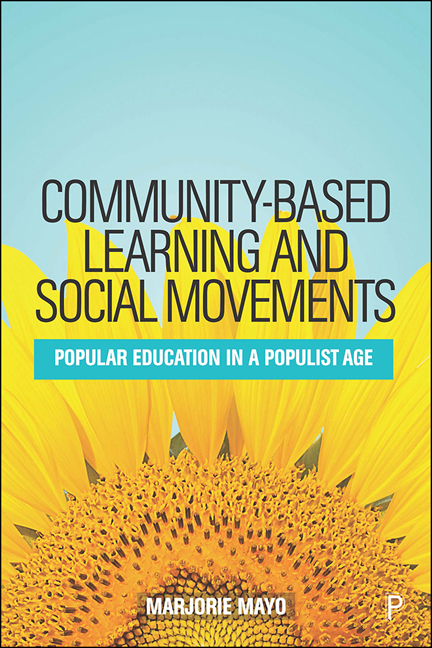Book contents
- Frontmatter
- Dedication
- Contents
- List of Figures
- Acknowledgements
- 1 Popular Education in a Populist Age
- 2 Popular Education and its Roots
- 3 Spaces and Places for Popular Education and Participatory Action Research
- 4 Principles and Practice
- 5 Sharing Understandings of Varying Histories and Cultures
- 6 Making Connections: Linking Issues and Struggles Across Space and Time
- 7 Power and Power Analysis
- 8 Community–University Partnerships
- 9 Taking Emotions into Account
- 10 Looking Backwards, looking Forwards
- References
- Index
5 - Sharing Understandings of Varying Histories and Cultures
Published online by Cambridge University Press: 10 March 2021
- Frontmatter
- Dedication
- Contents
- List of Figures
- Acknowledgements
- 1 Popular Education in a Populist Age
- 2 Popular Education and its Roots
- 3 Spaces and Places for Popular Education and Participatory Action Research
- 4 Principles and Practice
- 5 Sharing Understandings of Varying Histories and Cultures
- 6 Making Connections: Linking Issues and Struggles Across Space and Time
- 7 Power and Power Analysis
- 8 Community–University Partnerships
- 9 Taking Emotions into Account
- 10 Looking Backwards, looking Forwards
- References
- Index
Summary
The previous chapter emphasised the importance of tailoring popular education approaches and practices, engaging with varying interests and learning needs within and between communities and social movements. How then to understand these different interests and needs, as these have been developing over time? And how then to facilitate shared understandings of varied histories, cultures and interests within as well as between communities and social movements – as the basis for building solidarity for the future?
While I was thinking about writing this chapter, I participated in a documentary film showing, part of a series showing films about the history of industrial struggles. The aim was to stimulate discussion – popular political education via the use of film, in other words. And stimulate discussion it most certainly did, if not quite as I had anticipated. Far from engaging with the substance of the dispute in question, younger participants expressed amazement at the activists’ gender and ethnicity. How could they have been so predominantly male and so exclusively white? ‘Pale, male and stale’? Before we could begin to reflect on the dispute itself, let alone consider its potential implications in terms of the interrelations between trade unionists, their employers and the state, we needed to take a step back. How and why had trade unions developed as they had, in different industrial contexts, in the past? How had they organised? Why had particular occupations been predominantly the preserve of men – despite the fact that women had shown themselves well capable of doing the jobs in question, as demonstrated during both First and Second World Wars? And how had struggles for women's equality and campaigns for race equality been waged in different trade unions and labour movement organisations, over the years?
This takes the discussion back to the tensions and challenges inherent in the very definition of popular education itself. As previous chapters have already noted, ‘the real interests and struggles of ordinary people’ have been and are being understood and expressed in diverse ways, within and between communities and social movements, including social movement organisations such as the trade union movement.
- Type
- Chapter
- Information
- Community-based Learning and Social MovementsPopular Education in a Populist Age, pp. 77 - 94Publisher: Bristol University PressPrint publication year: 2020



